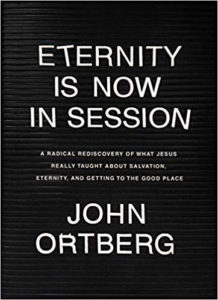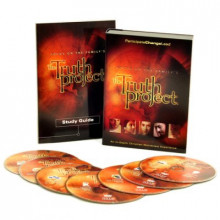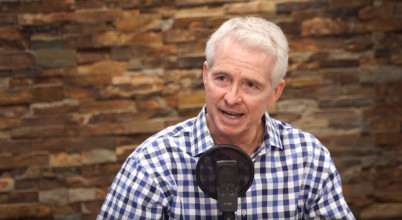Opening:
John Fuller: As believers in Jesus, we often use words like salvation and grace and eternity. And I wonder if we ever stop to think about what it really means to follow Christ. Well, Pastor John Ortberg is going to share some really poignant thoughts with us today about that on Focus on the Family. And we invite you to dive in. Your host is Focus president Jim Daly. And I’m John Fuller.
Jim Daly: John, being a Christian is more than just wearing a label, or doing the bare minimum to get into heaven. Just being a good person and playing by the rules is really a lightweight application of the faith. It’s about having a relationship with Jesus and giving our lives to him to experience what true life, what real life is all about and sharing that good news with others. And that’s what we’ll be getting into today. John Ortberg is the senior pastor of Menlo Church in San Francisco. He’s a popular author and speaker, all-around good guy. And he’s written an excellent book called Eternity is Now in Session. And John, I want to welcome you back to Focus.
Body:
John Ortberg: I love being at Focus. Thank you so much for having me.
Jim: This…
John O.: I can’t believe how casual this is.
Jim: What…
John O.: This used to be a coat-and-tie deal.
Jim: (Laughter).
John O.: And then it went to business casual. Now it’s blue jeans. Pretty soon, we’ll be in our jammies.
(LAUGHTER)
Jim: Well, let’s hope not. This is casual because we have a lot of pipe work going on (laughter), so we’ll come back to a little more dressy if you’d like that.
John O.: No, no, no.
Jim: (Laughter).
John O.: No, I love it. I’m a California guy.
Jim: Hey, you know, this is a really, uh, big topic in your book, Eternity is Now in Session. I think, at the core, you’re really alerting the church to live it. Isn’t that the core message?
John O.: You know, it’s amazing when you think that Jesus lived on the other side of the world 2,000 years ago. And his message keeps getting fuzzed up, and then we keep getting clarity around it again. And every time we do, we’re just staggered by this man. And, yeah. That’s a great way of saying it – I think to understand that Jesus’ core message is not primarily about something that will just happen when you die; it’s about something right here right now.
Jim: And we’re going to unfold that. But, I want to kind of get into some of the things that muddy the waters for us.
John O.: Yeah.
Jim: You know, here in the United States – and I’ve had the privilege to be able to travel the world. We’ve gotten into, if you say these things, then you’re in. And you’ve said – I think you say it in the book, “That’s a pretty small definition to salvation.” But, speak to it because, scripturally, it says, “If you confess that Jesus is Lord…”
John O.: Yes.
Jim: “…And believe in your heart…”
John O.: Yes.
Jim: There you have it. So how do we begin to go deeper with that even though it’s rather simple?
John O.: You know, one of the great problems is not the things I don’t know. It’s the things that I think I know that I don’t actually know. And, there’s so many words that, especially for those of us that have been around church for a while, we kind of think we know after a while.
Jim: Huh.
John O.: But we don’t understand them in the way that Jesus or the New Testament writers used them. So, for example, when I was growing up in the church, one of the questions we might ask around salvation would be, have you trusted Christ? And what we meant by that was, do you believe the right things about Jesus’ death so that they have to let you into heaven when you die? But in the Bible, to trust Christ doesn’t mean just trusting he made an arrangement to get you into heaven. To trust him means that you believe he’s right about everything.
Jim: Yeah.
John O.: And if you think he’s right about everything, then that means you’re prepared to do what he said to do about everything. And that’s what it means to trust Christ. That’s what it means to confess that Jesus is Lord.
Jim: Yeah.
John O.: And a lot of times, we’ve turned it from – now, to trust Christ means, “I’m ready to obey him in everything,” to, well, “If I trust him, I don’t have to obey him in anything, because I’ve got the arrangement for getting into heaven taken care of.” And we actually misunderstand what it is that he was saying and the power that he has to make life different.
Jim: And that is so good. I mean, you’re really hitting it. And I think when you look at the church today, especially here in the United States – and I think, too – I think Canada would agree with this. We can tend to live a very superficial faith.
John O.: Yeah.
Jim: And I guess the question for me is, why? If we really believe what we believe, why are we not deeper about the things of the Gospel, suffering and its byproduct…
John O.: Yeah.
Jim: …of making us better people, all those kinds of things? Why are we content with the superficial?
John O.: Yeah. You know, that why question is so huge. I do think one part of it is, we really have distorted Jesus’ message. And I remember, for me, a guy named Dallas Willard, who passed away a few years ago, was very helpful in rethinking this stuff. But…
Jim: Even the title of the book is something that…
John O.: It is.
Jim: Yeah.
John O.: It is. Yeah. Dallas taught philosophy – for folks listening to us that haven’t heard us – heard of him, he taught philosophy at USC. He was the smartest guy I’ve ever known. I used to joke, I would never get into an argument with Dallas, because I was afraid he would prove I don’t exist.
(LAUGHTER)
John O.: Um, but his wife…
Jim: And you’d believe him.
John O.: Yeah. And I would. Yes, I would. If he says it, then I don’t. The amazing thing about him, if you ever talk to anybody who knew him, was, his life was better than his mind. And he lived in the awareness of the presence of God like nobody I have ever known. It was just – God was present to him like this table is present to you and to me.
Jim: Wow.
John O.: And he would sometimes talk about eternity in that way. We often think that eternity is something that’s going on way out there someplace. And he would say, no. Eternity is already in session. It’s going on right now. God lives in eternity. And that’s what Jesus has come to make available to us. And if you want to, you can step right in to it. And I think a big reason why our lives don’t change more is, we think that salvation is only about something that will happen after we die. And we don’t understand, actually, Jesus’ offer is really about life right here, right now. And it’s not just that. It’s the greatest invitation that has ever been offered to humanity. And anybody whoever gets it is like a guy that finds a treasure buried in a field, and he says, “I gotta have that. I will give everything in order to possess that.”
Jim: Well, that’s exactly the question I want to ask, where it’s the rich, young ruler.
John O.: Yeah.
Jim: And that’s what you’re alluding to.
John O.: Yeah.
Jim: For someone listening that doesn’t know the story or maybe knows it barely…
John O.: Yeah.
Jim: …Describe that connection.
John O.: Ah, very often, what happens in our lives is, we lose the vision of how good life with God is. Our vision of that just leaks. And so, we think, “Well, what I’d really like is – I’d like a nice house, and I’d like to have a lot of money. And I’d like to have sexual pleasure, or I’d like to have power. I wish I was Jim Daly or…”
Jim: (Laughter) Yeah, right.
John O.: “And then I would be happy.” And what Jesus came to say is, “No. Every desire that you have, ultimately can find its satisfaction only in God.” But that’s God rightly understood. And that’s why he’s constantly trying to correct our distorted vision of spirituality. Another line of Dallas that I love – “Spirituality wrongly understood or pursued is a major source of human misery and rebellion against God.”
Jim: Wow.
John O.: “Spirituality wrongly understood is a major source of human misery and rebellion against God.” And so when it is wrongly understood, we think, “I don’t want it.” So, the rich, young ruler thinks, “Well, yeah. I’d like God. And I sure want to go to heaven when I die. But I don’t want to have to give all my money away because I really think that my money is what’s making me happy.”
Jim: Yeah.
John O.: And – and Jesus has a way of putting his finger on what is it that can most keep you from complete surrender to God and then say, “Now let’s go there.”
Jim: Yeah.
John O.: And, uh, you know, for the woman caught in adultery, go and sin no more. Or, for the rich young ruler, OK, give it away. Give the stuff to the poor, and then come and follow me. But all of us will face that. All of us will have some little idol that we’re really holding onto. And part of what Jesus does is to come and say, “You have to let go of that, but that’s not bad news. That’s not something you have to do with gritted teeth. If you understand what you can come alive to when you let go of this idol that enslaves you, you will do it with joy.”
Jim: And that – that’s the promise.
John O.: Yeah.
Jim: And that’s the misunderstanding.
Jim: Right. Right. It is so good. I need to emphasize, though, you’re not talking about a works-based faith. I mean, uh, I mean, James is pretty clear on what it means to be that Christian, to be faithful. But because of your faith, there will be certain things that you do that are correct, but you don’t do those things for the – for the free pass.
John O.: This is a huge topic. And a lot of times, especially people who have been damaged by legalistic churches or works-oriented churches, they get real nervous about talking about obedience to Jesus. So, couple of points on that front – one is, I think, a lot of times, we misunderstand grace, and we think of grace only as the forgiveness of sins. But actually, God was gracious way before anybody ever sinned. God has always been gracious. And grace is really God’s power in us to do what we couldn’t do on our own. So, it includes the forgiveness of sin, but it’s much larger than that. We’re not just meant to be forgiven by grace. We’re meant to live on grace.
Jim: Mmm.
John O.: Dallas used to say, “In our day, we often think that it’s only sinners who need grace.”
Jim: (Laughter).
John O.: “Actually, saints need grace much more than sinners do. Saints burn grace the way that 747s burn jet fuel.”
Jim: Wow.
John O.: We’re just meant to wake up in the morning – that’s a gift of grace.
Jim: Yeah.
John O.: …And to have this conversation not based on my strength or cleverness, but on God’s grace. God, you’re here right now. You’re with John, and you’re with Jim, and you’re with everybody listening to us. And there will be things that you want to say that will help people. I’m not smart enough to do that, but I can surrender to your grace in this moment, and then I don’t have to worry about the outcomes. And there will be impact on people’s lives that far surpass my ability or your ability. That’s grace.
Jim: Yeah.
John O.: And so, we’re invited to live in grace, but that doesn’t just mean I get my sins forgiven and then I’m passive. Another thing Dallas often would say is, “Grace is opposed to earning, but not to effort.”
Jim: Ah. That is good. These are good things to remember.
John O.: Yeah.
Jim: You know, John, so often people speak to the violence, the sadness, the heartache that this life has – that is in this world. And sometimes people use that as a – you know, an excuse that, if there was a God, then why would all this happen?
John O.: Yeah.
Jim: …All the negative stuff in life. How can you say eternity begins now when it doesn’t feel like it?
John O.: Well – and that’s part of what caused people to miss it in Jesus’ day.
Jim: Yeah. They were looking for the political…
John O.: They were looking for a political solution. They were looking for a human solution, as we all do.
Jim: Right.
John O.: And they thought power – and God knows how often in the church, in our day, there can be this misconception if we just had enough political power in the hands of Christians, everything would be OK. Well, you know, there was a lot of political power in the hands of Christians in the Middle Ages, and that didn’t work out real great.
John F.: Didn’t go so well.
Jim: Right.
John O.: Uh, usually, the church does worse when it has a lot of power.
Jim: Yes.
John O.: What happened with Jesus was, eternity came, God came, but He didn’t wipe out all opposition. He didn’t destroy the Romans. He didn’t destroy the pagans. In his great goodness and in his great mercy, he brought a kingdom of love and forgiveness and grace and mercy right here in the midst of violence and oppression and injustice. And it was that, it was the continued presence of all of this pain and suffering that caused so many people to miss it. But part of what Jesus said was, actually, God is present precisely to absorb, to take on himself, especially in the cross, all of the suffering and pain and hatred that humanity could lay on him. And he just kept loving. And he just kept – this is a really odd analogy. But I’ll think sometimes – there was an old boxer called George Foreman.
Jim: Oh, yeah.
John O.: And, he was the most feared guy in his day. And Muhammad Ali defeated him with what he called the rope-a-dope strategy.
Jim: Yep.
John O.: And he said, you know, “I’ll just let Foreman punch himself out.” And in a weird way – I know this is horrible language to describe the cross. But it’s like Jesus is saying, “I will absorb all the hatred and all of the sin, and all the darkness on the cross. I will take it on my body. And I will keep loving. And I will demonstrate, on the cross, love really is more powerful than pain and evil and suffering.” And so, His invitation to all of us is not, “Here’s a life with no suffering,” or where you get a free pass from a world of violence. But, it is to say, if you allow the existence of suffering and violence to be an excuse to live in despair and meaningless, you have done wrong. And, in your heart, you know it. And you can join the team that says, love and joy and mercy will ultimately triumph over violence and hatred. And that’s the light that the darkness cannot put out.
Jim: Right. Right. It is so good. You know…
John O.: Well, that’s why you had me on.
Jim: I – well, I – and I wanted (unintelligible).
John F.: (Laughter).
John O.: Don’t sound so surprised, man.
Jim: Now – now I – yeah. Boy, I didn’t know you were this smart, John.
(LAUGHTER)
Jim: But I want to get it down to everyday life too. So for me, I’ll use an analogy. And this wasn’t that long ago, so it’s even embarrassing.
John F.: I’ll bet it’s a driving analogy.
Jim: No, it’s not.
John F.: OK.
Jim: I mean, that’s my other issue.
John F.: (Laughter) Yeah.
Jim: I’m doing better with that one. But, you know, for the everyday Christian, if we could say it – that – it’s sometimes hard to remember grace for the other guy.
John O.: Yeah.
Jim: So – so I had a little issue with a telephone company, cellphone company. We had discontinued service for our boys on some emergency flip phones that you prepay. We called ’em – I don’t know – six, seven, eight times to get this stopped. And, uh, they assured us that had been stopped. Well, Jean discovered (laughter) they’d still been billing us for several months. So I called them up. And they said, “Oh, yeah. We’re willing to give you a quarter of the money back.” I said, “Well, you guys are just stealing from me. Why don’t you give me the whole amount back?” “Well, we can’t go back more than six months.” I got really upset.
John O.: Yeah.
Jim: I mean, I was mad. And I’m sitting there thinking, “I’m acting like Peter in the garden right now,” you know?
(LAUGHTER)
John O.: Give me a sword.
John O.: Yeah.
Jim: Give me a sword, and their ears are gone.
John O.: Yeah.
Jim: But, you know, it just – for me, it’s that practical, everyday application. How do I stay within my faith? Man, I thought about that, and I felt bad ’cause these poor people on the service end of phone calls like this…
John O.: Yeah.
Jim: It’s always a problem. It’s always a pain. And they’re getting the wrath of the company. In this case, it starts with A and it’s three letters.
John O.: (Laughter).
Jim: But, uh, you know, it’s always – they’re getting that call eight hours a day.
John O.: Yeah.
Jim: And, uh, that made me feel a little bad. But how do we put that into play as believers in everyday life?
John O.: Yeah. Uh, so this is great. For anybody who’s listening to us right now…
Jim: (Laughter).
John O.: It starts with, in this moment, asking, “Jesus, how can you and I do good in your world together?”
Jim: “Even though I’m suffering right now.”
John O.: Well…
Jim: (Laughter).
John O.: You know, and part of what that gets to is, what enables somebody in that moment, when you feel like you’re getting ripped off, to be OK? Well, if I believe that there really is a God who feeds sparrows and has counted the hairs on my head, then my well-being doesn’t depend on whether or not that person gives me as much money as I think I need. So, it is intensely practical. Do I actually believe that God is watching out for me? Then I can be free in any given moment. And, so it will be – for anybody who’s listening to us right now, the next person that you see, just ask yourself, “How can I bless this person?”
Jim: Even in the heat of a disagreement?
John O.: Totally, yeah. Yeah.
Jim: Yeah. Maybe, especially.
John O.: Yeah. Yeah. And it doesn’t mean that you don’t get mad at people. Sometimes people need to be gotten mad at. Sometimes people are doing wrong things, and they need to be confronted. So, grace doesn’t mean you go around like a doormat, or you’re soft all the time. But it means, even as I’m being mad at you, I’m asking, “God, help me to handle this anger well, and help me to will this person’s good even in this conversation.”
Jim: That’s good.
John F.: That is also challenging.
Jim: (Laughter).
John F.: And, uh, we want to encourage you to get other good challenges from John Ortberg’s book Eternity is Now in Session. We’ve got copies of that and also digital copies of this conversation at focusonthefamily.com/broadcast.
Jim: OK. Good. John, we know that sin separates us, and that’s the whole theme here – and that, uh, you know, Jesus’ sacrifice, resurrection is what pays that price, and that’s our way toward the father. You say, though, we have a closet of shame. I want you to describe that, and give us an example of what we need to do…
John O.: (Laughter) Of something I’m deeply ashamed of in my own life?
(LAUGHTER)
Jim: Yes.
(CROSSTALK)
Jim: It’s OK.
John O.: Wow. I didn’t know we were going there.
Jim: You wrote the book.
John: (LAUGHTER)
Jim: Yeah. I mean, that really is it.
John O.: Yeah.
Jim: So, people can understand what your point is there.
John O.: Yeah.
Jim: That really is it. So people can understand what your point is there.
John O.: Yeah
Jim: And shame – it’s always seen in a negative light. And I have to say, too – I try to avoid shame.
John O.: Yeah.
Jim: But shame has a role. Describe it.
John O.: Yeah. You know, shame is that crushing sense of defeat, or inward negativity at the thought that I am inadequate; I’m not right; I’m not the person I’m supposed to be. The capacity to have shame is a good thing. We’ll talk about people being shameless. And, a sociopath is shameless, so it’s not good to be a sociopath. It’s not good to be a narcissist. It’s good to have the capacity for shame. But mostly, shame has a tremendously destructive negative impact on us.
Jim: Parenting with shame is not healthy.
John O.: Oh, yeah. Using shame to try to control another person is a really bad thing.
Jim: Yeah.
John O.: And seeking to shame people almost always crushes their tiny, little kingdom. And so, sin is an enormously important topic. In our culture, it is decreasingly talked about, and that’s a huge problem. To be real practical with it, one of the things that I find very helpful is – I have a very good friend. I’ve known him for 40 years. I called him this morning. We call each other every morning at 10 ‘til 7. And we have a conversation about, how did you deal with yesterday, and what are you facing today? And what were your temptations? And, where do you need help from God? And then we pray with each other. We do that every day.
Jim: How many years did it take you to be honest?
John O.: Uh…
(LAUGHTER)
Jim: I mean, think of that. That’s really interesting and a great way to go.
John O.: Well, what happened was, I’d known him for many years – over 10 years – so that I really could trust him. I knew he loved me. And I decided, I’d like to have a friend before whom I have no secrets at all.
Jim: Wow.
John O.: Money, sex – for guys, I think a lot of times sex is the area of…
John F.: Sure.
John O.: …The most shame and the most hiddenness – and relationships, anger. And so, I spent a couple of weeks getting ready for this, just reflecting on my life, remembering things, writing stuff down. And then Rick and I went out, and for an hour and a half – I’ll never forget this. For an hour and a half, I told him this stuff that I was most ashamed of and embarrassed about.
Jim: Huh.
John O.: And I didn’t even want to look at him. And I got to the end of that hour and a half, and I just looked up, ’cause I knew this is just going to be awful. I’ll never forget this. And I did not expect these words. Rick looked at me. And what he said was, “John, I have never loved you more than I love you right now.”
Jim: Wow. That sounds like what God would say to you.
John O.: It was so powerful. I wanted to make up more bad stuff just to get…
Jim: (Laughter) Oh, man.
John O.: Grace, part of what I realized that was you cannot be loved without being known. And you can only be fully loved if you’re fully known.
Jim: Huh.
John O.: …Because, as long as there’s something you don’t know about me – you may say, “I love you,” but inside, I will – shame will say inside of me, “If you knew this about me, you would not love me.” And that’s where confessing and being forgiven by God, obviously, is fundamental. But in the church, we have a very practical role to play with each other. And there’s that old saying, “You’re only as sick as your secrets.” I deeply believe that’s true.
Jim: Well, in today’s church experience, that’s a very – unfortunately, a very difficult place to get to because we don’t open up like that, typically. That’s, you know, at least been my experience, talking with people, etcetera. We live at a very superficial level. And we’re not willing to be vulnerable, because sometimes you just can’t trust that person.
John O.: It’s a very interesting thing. You know, if you go to an AA meeting, they’ll just start with, “Hi. My name’s John. I’m an alcoholic.” And then there’s a level of raw honesty there, because people have been on a journey, where, for them to get that point of saying, “I’m an alcoholic,” has required intense humiliation. And the difficulty in the church is, I can say, “I’m a sinner.” But it doesn’t carry that same sting to it. And ironically, church is the place where we ought to be the most open about our failures, inadequacies, shame. And we ought to celebrate the recognition and confession of inadequacy. But we end up going there, you know, thinking, “I’m supposed to look good. God expects me to look good. Other people look good. They’ve got stuff figured out.” And, to create communities – for everybody to listen – listening to us to find a person to whom you can trust the secrets of your soul is incredibly powerful.
Jim: Yeah.
John F.: And that – what you’re talking about, John, is really how we have communicated the Gospel.
John O.: Yeah.
John : You have to be perfect.
John O.: Ah
John F.: You can’t be transparent…
John O.: Yeah.
John F.: …Uh, because we all walk around. We’re all good, right?
John O.: Yeah, yeah. No. And that’s where the message of grace is so incredibly important, that God accepts you precisely as you are. You don’t have to clean up before you come to Him. In fact, it’s impossible for you to clean up. In fact, his whole plan is for Him to do the cleanup operation. And that’s where the surrender of the will becomes so important that I come before God and I don’t have to clean anything up. Initially, my only job is just simply to say, “OK, God. I’m turning my life and my will over to you. My way is no good. Any time my way diverges from your will, it’s going to screw things up, so I want to surrender to you. But I come, uh, exactly as I am, and it’s only by grace that I’m accepted.”
Jim: And John, in that – in that journey, if I could say it this way, it feels like sometimes Christians get discouraged, because it’s a constant kind of buoyancy. In other words, sometimes, you’re underwater. Sometimes, you’re above water.
John O.: Yeah.
Jim: Sometimes, it’s going well in your obedience to the Lord, and then other times, you mess up.
John O.: Yeah.
Jim: And we don’t really, emotionally, I think, understand – it’s OK. God’s gonna brush you off – all the dirt and dust.
John O.: Yeah.
Jim: He’s going to pat you on the back…
John O.: Yeah.
Jim: …And say, “OK. Let’s go.”
John O.: Yeah.
Jim: We get discouraged, and some Christians live that life, where, when they can’t live it, you know, they just give up. They throw in the towel because they’re trying to live to a perfectionistic ideal, I think, rather than understanding we’re all sinners saved by grace. And in this life, like Paul said…
John O.: Yeah.
Jim: I mean, the apostle Paul said, “What I want to do, I don’t do.”
John O.: Yeah.
Jim: “And what I don’t want to do, I do.”
John O.: Yeah.
Jim: I mean, there’s – I’m so glad he put that in there, right?
John O.: Yeah. No, I think that’s where the, that whole idea of one day at a time, you know, where Jesus says,”You just live. Tomorrow has trouble in and of its own; grace for today. Manna comes for today.” In AA, they’ll say, “All that we have is a daily reprieve – just – just a reprieve for this day.” And yeah, in the church, if we can just get that and say, “My only job is to show up with God today. God, would you help me today?” I don’t have to try to figure out how far have I come over the last five years, or 10 years, and in fact, only God knows. And usually, when we try to ascertain levels of spiritual maturity in ourselves or other people, we don’t get it right anyhow. It’s just like, I don’t have to worry about it. I don’t have to be discouraged by how inadequate I feel. All I gotta do is just show up today and bring the real me before the real God. That’s the only job.
Closing:
Jim: And it is so true. One day at a time, as you said John. Thanks for helping us to think more deeply about our salvation. You would think we would think a lot about that. I want to come back next time and discuss what it means to be a follower, or disciple, of Christ….and also have a discussion about what’s happening in those situations where someone renounces the Christian faith and walks away. There have been a few people does that recently and I would like to get into that.
In the meantime, please get John Rothberg’s great book that describes what it means to live the Christian life. It’s called Eternity is Now in session. And we want to get this book into your hands, and for a donation of any amount to Focus on the Family, we’ll send it along as our way of saying thank you. If you can’t afford it, I believe in this content I will send it to you if you can’t afford to help us. That is okay. Others, I’m confident, will make up the gap. So, thank you.
John F.: Yeah, donate today and request your copy of Eternity is Now in Session when you call 800 A Families 800-232-6459 or at focusonthefamily.com/broadcast. And as we have been talking about having an actual relationship with the real God, as John said. We want you to learn more about that if it seems a little bit foreign, if you are not sure what that means. We have a great booklet called COMING HOME: AN INVITATION TO JOIN GOD’S FAMILY. Look for that at our web site, it will explain what it means to become a Christian and to walk with God. Again the site focusonthefamily.com/broadcast.
Jim: Thanks again for being with us.
John O.: You know, Colorado Springs in the summer time, anytime baby.
John F.: On behalf of Jim Daly and the entire team, thanks for joining us today, for Focus on the Family, I’m John Fuller inviting you back next time, as we once again help you and your family thrive in Christ.




















